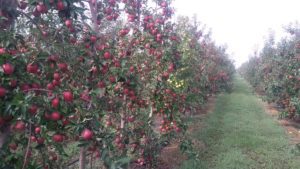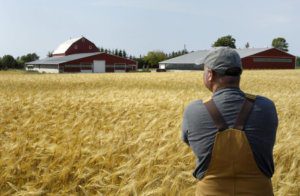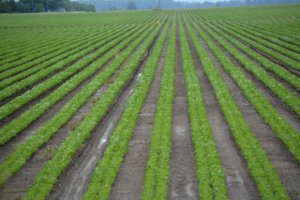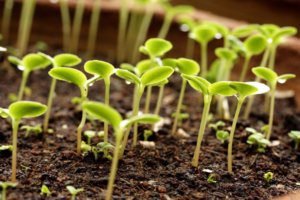
The Ukrsadprom has addressed the Ukrainian president, prime minister and leaders of the political parties asking to introduce some measures for the development of gardening, in particular, to introduce the fixed land tax per ha depending on the type of economic activities.
According to the press service of the association, Ukrsadprom also asked to return preferential VAT for farmers, to provide state support for the export of horticultural products, and also to modernize the industry’s subsidy program with a focus on processing.
As reported, the Ukrsadvynprom association asked the Agricultural Policy and Food Ministry to adapt the program of state support for gardening to berry enterprises, as well as to expand the list of wine-making areas.

AgroFoodCluster Kharkiv, uniting small and medium-sized agricultural producers in Kharkiv region, plans to develop a direct export scheme for small farmers in 2019, Cluster Chairman Yuriy Mykhailov has said. “Next year we want to build an export scheme for our farmers, according to which they will be able to receive currency into their account. This is the main motive for the region, so that the currency comes to the manufacturer, and does not remain partially abroad, which most traders abuse,” Mykhailov told Interfax-Ukraine at the third Ukrainian-German forum “BEA: Bioenergy, Energy Efficiency and Agribusiness” in Kharkiv.
According to him, the cluster in 2019 also intends to increase the number of participants.
Among the projects of AgroFoodCluster in 2017-2018 is the participation in the ANUGA food fair (Cologne, Germany). According to Honorary Consul of the Federal Republic of Germany in Kharkiv and managing partner of ILF Tetiana Havrysh, this allowed the cluster members to get new contracts in the European, Asian and African markets.
Mykhailov said that the cluster also carries out joint projects with the ILF law firm, aimed at raising the legal awareness of cluster members on taxes and protecting businesses from illegal seizures.
“The last initiative that we have to implement is to become representatives of the Ukrainian Agricultural Council, which actively protects the interests of producers, and cooperate with them on the protection of the property of our participants,” Mykhailov said.
According to him, in October 2018, the cluster included 19 companies.
“If there are about 400-500 agricultural producers in Kharkiv, the share of cluster members is very small. We had a goal to reach 100 participants, but this is quite difficult,” he said.
According to Havrysh, the priorities of the cluster are also cooperation with educational institutions, which are part of the cluster, to improve the quality of staff, as well as the development of communities.
“Now the cluster is looking for strategies for introducing green tourism. It is launching cultural programs. This is an evolution, although it may not be fast, because the Ukrainian government does not have a specific strategy regarding clusters,” she said.
Havrysh said that the cluster is also interested in creating a branded regional product to increase competitiveness in the domestic market.
“This can seriously influence domestic exports between regions in Ukraine. We often see products from Western Ukraine in Kharkiv, but it is unlikely that products from Kharkiv are seen in Western Ukraine,” she said.
As reported, the AgroFoodCluster Kharkiv was created in July 2017 intending to bring the region’s products to new markets.

Farmers registered 514 crop receipts for the amount of UAH 3.2 billion in January-September 2018, Ukraine’s Agricultural Policy and Food Ministry has reported.
According to the ministry’s report, crop receipts were issued with future crops used as collateral. Since the launch of the tool as of October 9, 2018, farmers registered 696 crop receipts for the amount of UAH 4.4 billion, including 290 commodity receipts for UAH 2.5 billion and 406 financial receipts for UAH 1.9 billion.
The ministry said that liabilities under 176 crop receipts for UAH 1.4 billion were completed.
The ministry said that in 2018, 74% of the total crop receipts were registered. Producers of grain and oilseeds, producers in vegetable growing, gardeners and livestock breeders used the tool.
The ministry said that 54% of crop receipts were issued to entities with a land bank of 1,000-5,000 ha, 36% – with over 5,000 ha and 10% with up to 1,000 ha.

Ukrainian farmers have the full amount of mineral fertilizers required for carrying out spring field works and the expansion of safeguard measures for the import of mineral fertilizers would not create an artificial shortage of fertilizers, Ukraine’s First Deputy Prime Minister, Minister for Economic Development and Trade Stepan Kubiv has said.
“As of today, the market of mineral fertilizers is fully saturated for the spring field work, which was confirmed by the Ministry of Agricultural Policy and Food, profile associations and producers. Last year, with the efforts of the government, Verkhovna Rada deputies and associations, we launched the fertilizer producing enterprises, but they have not yet loaded their facilities in full. I’m talking about the Odesa Port-Side Plant, Sumykhimprom, Severodonetsk Azot, Cherkasy Azot and others,” he said, responding to a question from Interfax-Ukraine at a press briefing in Tuesday.
The first deputy prime minister also said that 12 safeguard trade measures are in effect with regard to the import of mineral fertilizers from the Russian Federation, including 10 anti-dumping measures, as well as countervailing and special measures.
According to Kubiv, there is no artificial shortage of mineral fertilizers for spring works, but there are questions to the group of fertilizers used in autumn works.
“Now we have a big request to the deputies that in the autumn we would settle this issue not by a resolution, but at the legislative level,” he said.
Kubiv said that the decision of the Interagency Commission on International Trade to expand the effect of anti-dumping measures on the import of ammonium nitrate from Russia to Ukraine with an increase in duties on the import of mineral fertilizers from Russia to 42.96%, made on March 26, was unanimous.